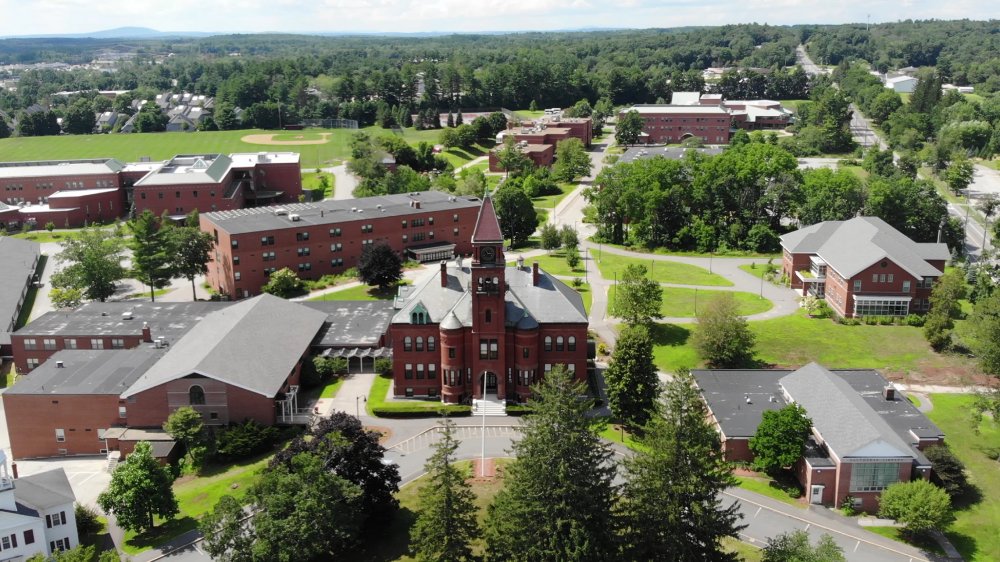-
About
- About the Academy
- Administration
- Annual Report
- Awards & Recognition
- Board of Trustees
- Business and Community Connections
- Calendars
- Communications
- Compliance (Policies)
- Current 8th Graders
- Directory
- History
- Mission & Vision
- Pinkerton News
- Social Studies Wing -- Building Project
- Start Time Committee Information
- Strategic Plan
- Technology
- Academics
- Admissions
- Alumni
- Athletics
- Careers
- Clubs & Activities
- Stockbridge Theatre
History
Pinkerton Academy was founded as an independent day and boarding school and generously endowed by brothers Major John and Elder James Pinkerton, town leaders and “old-time merchants of Londonderry” who envisioned the establishment of a local institution that would promote piety and virtue and educate youth in the liberal arts and sciences and prepare them for college studies. The academy was incorporated by the state of New Hampshire on June 15, 1814, and the following year, the Board of Trustees chose a location to erect a school building in Derry Village, along the new Londonderry Turnpike (Bypass 28). That original building has since been joined by twenty-two others.
Students arrived for the first day of classes on December 4, 1815. In 1816, the first year for which records survive, the two preceptors hired by the Trustees had under their care forty-four boys and twenty-seven girls. Most of them hailed from Londonderry (which was divided into Derry and Londonderry in 1827) or nearby towns. Those from farther away (including Methuen and Charlestown, Mass., and Berwick and Machias, Maine) boarded in the homes of the Pinkertons and with the families of other trustees. Girls were taught in a separate department from 1817 into the 1820s, but after the Adams Female Academy opened in East Derry Village in 1824, none were admitted to Pinkerton again until 1853.
In 1881, upon the death of Elder James’s son John M. Pinkerton, a successful Boston lawyer and businessman and president of the Board of Trustees from 1871 to 1881, the Academy received a second munificent bequest. The Trustees used the funds to increase the number of instructors and to provide for an enlarged campus and advanced program of studies. The completion of the new building in 1887 more than doubled the size of the school’s physical plant and, with changes to the curriculum, allowed Pinkerton students to choose from a variety of college prep and other programs of studies. Robert Frost taught English classes in the new building from 1906 to 1911 before gaining fame as one of America's most beloved poets.
In the school’s first century, Pinkerton graduates went on to serve the nation as state governors and lieutenant governors, state and federal judges and justices, U.S. Senators and Congressmen, ministers, college presidents and professors, and military officers. Later, Alan B. Shepard Jr. (Class of 1940) was America’s first man in space in 1961 and walked on the moon in 1971 as commander of NASA’s Apollo 14.
In 1948, the Academy entered into a service agreement with the Town of Derry in which Pinkerton committed to educating all high school–aged students who lived in Derry. The Town of Derry paid for the school's services on a per pupil tuition basis. Although Pinkerton maintained its private school status, the Academy began to function as a comprehensive independent academy.
In 1962, Derry negotiated a long-term contractual agreement with Pinkerton Academy. The contract specified the terms and conditions under which Pinkerton’s services were purchased. Over the next half-century, additional communities (Chester, Hampstead, Londonderry, Windham, Hooksett, Auburn, and Candia) signed service contracts with the Academy. In response to the increased number of students attending Pinkerton, new facilities were built. Due to the changing needs and interests of this larger and more diverse student population, Pinkerton once again developed new courses and fields of study while maintaining outstanding college preparatory programs.
During the 1990s, Pinkerton continued preparing for the educational challenges of the 21st century as the value of a traditional education was reexamined. Led by a visionary and supportive Board of Trustees and dedicated school personnel, Pinkerton’s goal was to adapt to a changing society while preserving the qualities that made the Academy an excellent high school. To accomplish its goal, Pinkerton embraced three fundamental principles:
- The school’s future is built around the strengths of its history and traditions;
- It is uncompromisingly committed to educational excellence; and
- It is dedicated to a continuing faith in the democratic way of life.
Today, Pinkerton Academy is as strong and vibrant as at any point in its over two hundred year history. Pride, dedication and loyalty, long-term trademarks of the Pinkerton community, continue to be the Academy’s greatest strength. We are proud of who we are, clear about what we stand for, and confident about the direction we have chosen.


